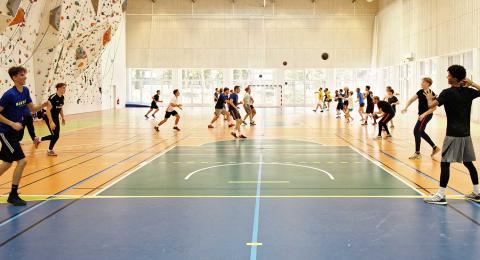The M1 BIBS-IA program focuses on the high-level research and development needs of companies and research organizations in bioinformatics and biostatistics. This multidisciplinary program meets this demand by training specialists at the interface of three disciplines: Biology, Computer Science, and Mathematics.
The M1 BIBS-IA program is structured around several knowledge and skills blocks (Refresher, Bioinformatics and Biostatistics, Algorithms and Programming, Professionalization).
This first year of the Master's program initially focuses on differentiated refresher courses in computer science, mathematics, and biology, tailored to each student's initial background. It then allows students to acquire the necessary theoretical and practical foundations to address the various challenges in bioinformatics. The year concludes with a mandatory 2-month research internship in a research laboratory or a company.
Information
Skills
Upon completion of the M1 BIBS-IA year, students are capable of independently implementing innovative computer and mathematical methods to perform a data analysis or a simple modeling task. They will also be able to understand, modify, and/or design a bioinformatics workflow, extract the most relevant results from it, and present them clearly.
Objectives
The main objective is to equip students with the necessary tools for the analysis and modeling of massive data (Big Data) in biology. To achieve this, students will progressively gain mastery of several programming languages as well as a number of methods in algorithms, databases, artificial intelligence, statistics, and mathematics. They will also deepen their knowledge of various key areas of bioinformatics such as systems biology, structural biology, functional genomics, and more.
Career Opportunities
Career prospects
Après Master + Doctorat : chercheur ou enseignant-chercheur
Expert science des données
Expert en gestion de données
Gestionnaire de plateforme
Ingénieur Bioinformaticien (Recherche et Développement)
Après un Master : Data scientist
Après un Master : Spécialiste en intelligence artificielle (IA)
Ingénieur de recherche ou d'études
enseignant.e-chercheur.se (après un doctorat)
data scientist
Consultant·e
Further Study Opportunities
Doctorat en Bioinformatique
Mastère spécialisé
domaines de l’apprentissage statistique, de l’intelligence artificielle ou de l’analyse de données avancée
Data Scientist, Data Analyst, Ingénieur·e en Machine Learning dans des secteurs innovants (tech, finance, santé, énergie, etc.) ;
Chercheur/chercheuse en R&D ou expert·e en modélisation et analyse de données dans des entreprises ou laboratoires de pointe.
Chef·fe de projet/de mission
Fees and scholarships
The amounts may vary depending on the programme and your personal circumstances.
Admission Route
Capacity
Available Places
Target Audience and Entry Requirements
As this is a multidisciplinary program in Biology, Computer Science, and Mathematics, students holding a Bachelor's degree in Biology, Mathematics, or Computer Science, a dual-major Bachelor's degree (CompSci+Math, CompSci+Bio, Math+Bio), or any equivalent diploma are eligible to apply for admission. Although they are not excluded, applications from students who already hold a Master's degree or an equivalent qualification will be considered not prioritized.
Application Period(s)
From 24/02/2026 to 23/03/2026
Supporting documents
Compulsory supporting documents
Motivation letter.
All transcripts of the years / semesters validated since the high school diploma at the date of application.
Curriculum Vitae.
Additional supporting documents
Certificate of French (compulsory for non-French speakers).
VAP file (obligatory for all persons requesting a valuation of the assets to enter the diploma).
Supporting documents :
- Residence permit stating the country of residence of the first country
- Or receipt of request stating the country of first asylum
- Or document from the UNHCR granting refugee status
- Or receipt of refugee status request delivered in France
- Or residence permit stating the refugee status delivered in France
- Or document stating subsidiary protection in France or abroad
- Or document stating temporary protection in France or abroad.










